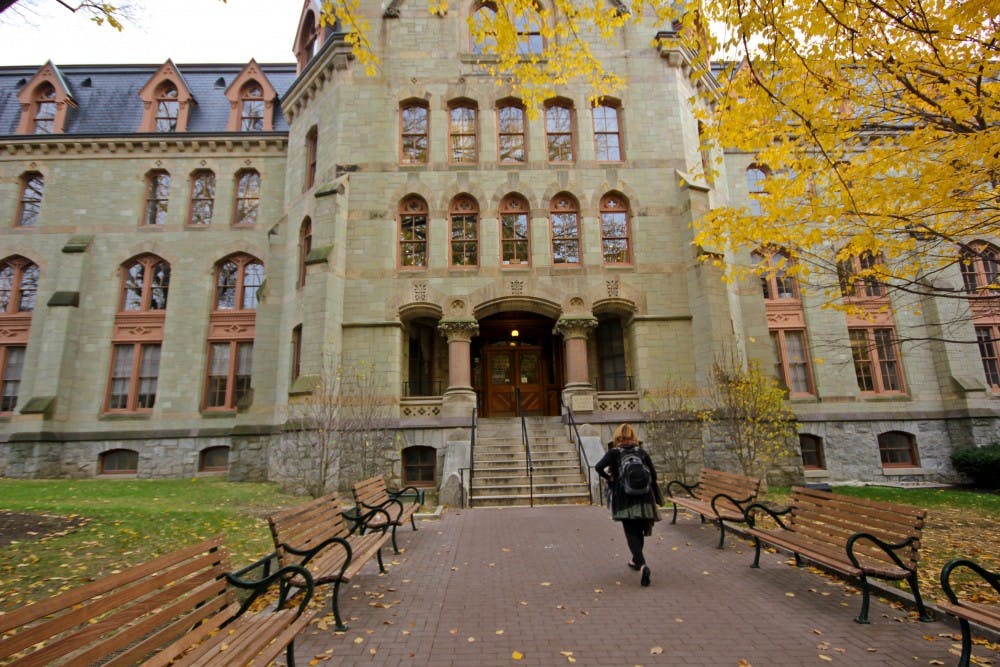
DP File Photo
Credit: Luke ChenPenn has revamped its policies on free speech and expression over the past academic year, modernizing rules and regulations that have existed for decades.
This year’s Committee on Open Expression — a body comprised of administrators, faculty and students collaborating to foster free speech — was far more active in 2014-2015 than it had been in years past, holding eight full committee meetings throughout the year. The committee aims to discuss, amend and expand the University’s Open Expression Guidelines, a set of principles that guarantees free speech across campus.
In previous years, the main activity of the group was to organize Open Expression Monitors, volunteers who attend meetings and demonstrations to ensure that the guidelines are upheld. But the 2014-2015 Committee spent the year addressing two primary issues: the nationwide trend of universities disinviting controversial speakers to events, and the dilemma of how the open expression guidelines should apply in the digital age.
In 2014, several commencement speakers, including high-profile names like Christine Lagarde, the first woman to head the International Monetary Fund, and Condoleezza Rice, former Secretary of State, were disinvited to university commencements after pressure from students who disagreed with the speakers’ views. Through the Committee, Penn is actively working to distance itself from that trend.
“No one may put official duress, threats, pressure on anybody else to make them disinvite a speaker,” said Penn Law professor Stephanos Bibas, the 2014-2015 committee chair. “Any university power should not be brought to bear to make anybody change his or her mind.”
The Committee channeled this ideal into their work on a second issue, open expression on the internet.
“Open expression in cyberspace still counts, even though they’re virtual locations, not physical locations — the same rights, the same restrictions,” Bibas said. “Whatever’s protected on Locust Walk, is protected in cyberspace as well.”
Provost Vincent Price maintained that Penn is committed to providing space for all viewpoints, even in the face of controversy. “The pressures to be civil seem to conflict with the rights to open expression,” he said. “We’re not going to go down these roads. We’re just not going to do that.”
Price also spoke of the success of the Open Expression Monitor system. Just before the start of classes, undergraduates received an email from Price, encouraging them to consider joining the program.
“We’ve seen this at many events at Penn,” Price said. “It’s enormously productive.”
Despite the success of the Open Expression Monitors system, this year’s committee aimed to do more. Bibas said that although Penn’s history of maintaining free speech is an admirable one — the University has never withdrawn a speaker’s invitation and remains the only Ivy League school to have earned a Green Light rating from the Foundation for Individual Arts and Education — there was still a need for change.
“Penn has a very good, very robust history of open expression,” he said. “But cultivating a garden requires tilling it, and weeding it and paying attention.”
The committee addresses issues that are important to many students, said College senior Aaron Senior, who joined the 2014-2015 committee as an undergraduate member.
“The default should have been the committee was active, considering this is a big deal on campus, and it’s a really important thing that we uphold and continuously update it to make sure it meets the needs of the students and the entire University body,” he said.
This year, the committee worked to incorporate student feedback into their work — it held an “open hearing,” a planning session where members of religious and political groups were given the opportunity to provide input.
Senior, who spoke with many students throughout the process, said that people generally seemed uninformed about the committee, but became interested in its work upon learning more about it.
“There was a general trend of lack of knowledge,” he said. “And then I would say a general trend of people interested in hearing what ideas we have to come up with.”
Although the 2015-2016 committee has yet to be announced, the report of the 2014-2015 committee set several goals for the months to come, including fostering better communication between schools and departments, integrating open expression programming into New Student Orientation, clarifying the messages of Penn speakers abroad and raising awareness of the Guidelines among students.
The Daily Pennsylvanian is an independent, student-run newspaper. Please consider making a donation to support the coverage that shapes the University. Your generosity ensures a future of strong journalism at Penn.
DonatePlease note All comments are eligible for publication in The Daily Pennsylvanian.







